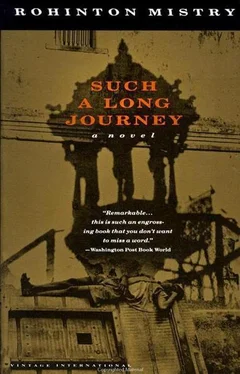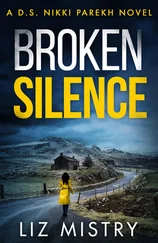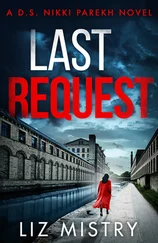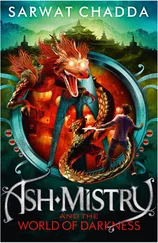‘Is there nothing more I can do?’
Her persistence vexed Miss Kutpitia; then, as a matter of compromise, she said, ‘Do Tehmul’s nails again. Add a lock of his hair this time. On the day after the new moon. His channels will be open widest that day.’ Wagging her bony forefinger, she admonished her again: ‘But you must be patient.’
Dilnavaz ventured timidly, ‘You had said there was a final remedy we could try if everything failed—’
Miss Kutpitia cut her off sharply. ‘I have told you not to think of that. Put it out of your mind. At once.’
‘Whatever you wish. You know best, that’s why I come to you.’ She thanked her humbly and left.
Dinshawji’s advice to Gustad was to comply with everything Ghulam Mohammed said. ‘Don’t defy him. Just do it quietly, then we can forget about the bastard.’
‘But we’ll have to withdraw two bundles a day. That’s the only way we’ll finish in thirty days.’
‘Don’t worry, leave that to me.’ Dinshawji went about the task quietly, confidently. Each evening he passed two bundles to Gustad, who took them home and stuffed them back into the hateful black plastic under the choolavati.
The bank was abuzz with the remarkable case in New Delhi. It was not very often that a Parsi made the newspapers for a crime. The last sensation had been more than a decade ago, when a naval commander had shot and killed his wife’s lover. In the canteen, they debated Major Bilimoria’s dubious confession, and the plethora of startling facts that the investigation was uncovering. Most of them refused to believe he could have imitated the Prime Minister’s voice, there was something very fishy about the whole thing, they said.
Dinshawji and Gustad took part in these discussions, trying to show a normal interest. Dinshawji handled it so well, thought Gustad, filling with admiration for the cool courage and good sense. Here was no clown or buffoon, but a solid, dependable friend. How badly I misjudged him. And how will I ever repay him for all his help?
Before long, the thirty-day deadline reached the halfway mark. Gustad emerged to pray at dawn and found the rose plant, the vinca, and the subjo bush hacked to the ground. Every stem, every branch had been slashed off, chopped into little pieces.
No point in calling the Gurkha, he thought. Why make a fuss? But Jimmy loved the vinca, sometimes he would come to water the flowers in the morning.
He stood there for a minute or two, then fetched the rubbish pail and quietly gathered up Ghulam Mohammed’s bloodless reminder.
Dinshawji stepped up the pace to withdraw three bundles a day, and Gustad wished he had not mentioned Ghulam’s threats. But the least he owed Dinshawji now was complete honesty. ‘Isn’t that dangerous, Dinshu? Thirty thousand will be highly noticeable on the ledger, don’t rush it.’ Dinshawji said there was nothing to worry about, he knew what he was doing. So the account was emptied five days ahead of the deadline.
That evening, Gustad shook his hand fervently. ‘Thank you, Dinshu, thank you. I don’t know how to thank you enough, so much you’ve done for me.’
‘Forget it, yaar, ’ he smiled. ‘It’s nothing.’
But it was only the next day, after Dinshawji had expunged all traces of the fictitious account, that Gustad learned the truth. Dinshawji collapsed just before lunch, and was rushed to Parsi General. Mr. Madon sent a messenger to Dinshawji’s wife, and granted Gustad’s request to ride in the ambulance.
As it sped through the streets, its siren wailing, Dinshawji regained consciousness. ‘It’s OK, Dinshu, everything will be all right,’ said Gustad. ‘Your wife has been informed, she will come to the hospital.’
‘My domestic vulture,’ said Dinshawji, smiling weakly. ‘God bless her, she will come flying.’ The ambulance weaved in and out of traffic, at times grinding to a halt, making Gustad curse and fret. He gazed upon Dinshawji’s face and noticed how the dewlaps under his chin had, in repose, collapsed into little rolls of skin along the throat.
Dinshawji opened his eyes again. ‘Now you know, Gustad, why such a big rush. I could feel that not many days were left. So I began to take out three, to finish the job. Before it was too late.’ Gustad took his hand in both of his. The thing in his throat made it impossible to speak. The hand felt cold, and very smooth.
Dinshawji’s wife was not there when the ambulance reached Parsi General. ‘Traffic is bad,’ said Gustad reassuringly. ‘Alamai must be caught in the jam.’ He stayed with him while a bed was found in the male ward and the formalities were completed. It was the same ward where Dinshawji had spent time six months ago.
Dinshawji urged him to get back to the bank. ‘Or else that Madon will start marching up and down, asking why Mr. Noble is taking so long to come back.’
‘Don’t worry about Madon. I am going to stay here till the doctor sees you.’
‘Not necessary, yaar. This place is like a vacation home for me.’ His eyes twinkled the way they used to before Laurie Coutino’s complaint. ‘All the comforts and conveniences I can imagine.’ Then he sang softly, out of tune:
O give me a home where the nurses’ hands roam,
Where they all have big beautiful tits;
But where seldom is heard an encouraging word,
And the patient is treated like shit.
Gustad laughed. ‘Shh! If they hear you, they will give you a tough time. These people don’t know how to appreciate a Poet Laureate. You know their favourite way to harass patients?’
‘What?’
‘When you ask for the bedpan, they make you wait and wait till you think you cannot hold it any more.’
Dinshawji chortled, holding his stomach where it hurt. ‘ Arré, let them try that with me. I will just let go, dhuma-dhum, dhuma-dhum. Right in the middle of the bed. And make the whole hospital stink. More work for them only.’ They laughed again. Then Gustad shook his hand and left. At the registration desk, he made the clerk note Miss Kutpitia’s telephone number next to Alamai’s, just in case.
He did not return immediately to the bank. Outside, in the hospital grounds, the sun was shining on the lawns. He found a bench along a path between flowerbeds. A butterfly flitted among the flowers. He saw its brilliant orange and black patterns before it floated away. Sohrab had one like that in his collection. Monarch, he said its name was. I can remember perfectly. After the rain, at Hanging Gardens. Everything was in bloom. Sohrab all excited the night before, making plans. And so shy in the garden, with his sudra —and — racquet net. But he caught five that day. Monarch was first. He removed it from the killing-tin with his tweezers, its antennae crippled, thorax contorted. A cloud had passed over Sohrab’s face when he saw that twisted butterfly, and Gustad knew his son would not pursue the hobby for long.
How much of all this does Sohrab remember, he wondered. Very little, I think. For now. But one day he will remember every bit. As I do, about my father. Always begins after the loss is complete, the remembering.
The butterfly returned, gliding on a slow breeze. He watched till it became a speck and disappeared from sight.
When the lumps of alum fell on the hot coals, they fused into a single blob. The blob bubbled and frothed, making a hissing, gurgling sound as it perched viscously atop the coals. Roshan watched with interest till the coals lost their red heat and the seething activity ended.
‘Now back to bed,’ said Dilnavaz. ‘You will feel better after these prayers.’ She observed curiously, fearfully, the smooth, white contours the alum had assumed. How wickedly it sits on the coals. This evil thing. It separated easily from the embers, light and brittle. Like a fresh khaari biscuit, she thought, concealing it in a paper bag — the clue to the dark force harming her child.
Читать дальше












